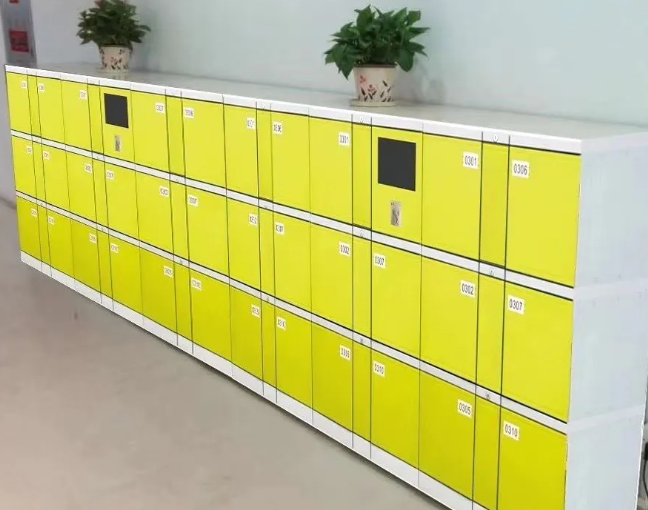Innovative Applications and Management Optimization of Smart Cabinets in Factory Workshops
With the arrival of Industry 4.0, intelligent equipment is profoundly changing the management model of traditional factories. As an important carrier of IoT technology, smart cabinet systems, through innovative functions such as facial recognition, RFID technology, and smart charging, are providing the manufacturing industry with comprehensive material management and employee service solutions. This article will delve into the specific application value and implementation points of three types of equipment in factory scenarios: smart material cabinets, facial recognition storage cabinets, and mobile phone charging cabinets.
I. Smart Material Cabinets: Achieving Digital Control of Workshop Materials
Technical Architecture Analysis: The smart material cabinet adopts a composite technology solution of "RFID + weight sensing + cloud database." Each material compartment is equipped with a high-frequency RFID reader/writer, which can automatically identify materials with electronic tags; pressure sensors monitor inventory changes in real time; the cabinet integrates an industrial-grade touch screen that is directly connected to the back-end MES system. A case study from an automotive parts company shows that the system's recognition accuracy reaches 99.97%, far exceeding traditional barcode scanning methods.
Management Process Restructuring
Issuance Process: After employees swipe their cards to verify their identity, the system automatically matches work order requirements and intelligently guides them to the designated storage compartment.
Return Mechanism: A weight threshold alarm is set; returns cannot be completed if the weight does not meet the standard.
Early Warning System: Replenishment reminders are automatically triggered based on historical consumption data and pushed to the purchasing department two working days in advance.
Benefit Quantification Analysis: Data from an electronics factory in Guangdong shows that tool search time was reduced by 82%, inventory turnover increased by 45%, and material losses due to incorrect issuance decreased by 67%. Particularly in precious metal raw material management, 24-hour full-process tracking was achieved.

II. Facial Recognition Lockers: Intelligent Management of Employee Items
Upgraded Biometric Technology: Adopting a "3D structured light + liveness detection" dual verification solution, it can maintain a fast recognition time of 0.01 seconds even in strong light conditions in the workshop. After deployment in a heavy industry company, it completely replaced traditional key lockers, resulting in zero key loss incidents annually.
Dynamic Space Allocation Algorithm
Automatic Matching Mechanism: Automatically allocates cabinet space based on employee shifts and job types.
Flexible Expansion Function: Supports temporary requests for additional storage space to meet the needs of shift workers.
Emergency Opening Process: A three-tiered authorization system allows for remote opening with authorization from the safety supervisor in special circumstances.
Value-Added Services: Smart cabinets with integrated drying and dehumidification modules are popular in southern factories, solving the problem of storing work clothes during the rainy season. An employee satisfaction survey at a textile company showed that this feature increased locker user satisfaction by 31 percentage points.
III. Mobile Phone Charging Cabinets: A Balance Between Safe Production and Humanistic Care
Safe Charging System Design
Intelligent Power Distribution: Independent overload protection for each compartment, supporting QC3.0 fast charging protocol
Temperature Monitoring: Built-in thermocouples monitor in real time; automatic power-off when the temperature exceeds 45℃
Disinfection Function: Equipped with UV-C ultraviolet lamps, automatically sterilizing every 2 hours
Production Management Optimization: Data from a precision instrument manufacturing plant shows that:
Incidents of employees bringing mobile phones into the cleanroom decreased by 100%.
Increased employee focus led to a 12% increase in average daily production capacity.
Improved shift handover efficiency: Centralized management avoids time-consuming searches for individual mobile phones.
Employee Incentive Innovation: A points-based reward system links the standardized use of charging cabinets to benefits: 30 consecutive days of compliant use can be redeemed for additional power bank rental time. This measure increased compliance from 58% initially to 93%.
IV. System Integration and Future Evolution
Platform-based Integration Solution: By integrating three types of smart cabinets into a unified management platform through industrial IoT gateways, the following features are achieved:
Energy Monitoring: Real-time display of energy consumption data for each cabinet
Operation and Maintenance Early Warning: Proactive prediction of equipment failures
Data Analysis: Generation of multi-dimensional reports on personnel behavior and material consumption
5G Technology Empowerment: In a 5G private network environment at an aerospace manufacturing base, the smart cabinet system exhibits new characteristics:
Cabinet status monitoring latency<10ms
Support for AR remote operation and maintenance guidance
Real-time synchronization of material information with the digital twin system
Sustainable Development Path: The next generation of products will integrate AI prediction algorithms to achieve:
Intelligent prediction of material demand
Adaptive adjustment of storage space
Personalized recommendation of charging strategies
Conclusion: The value of smart cabinet systems has transcended the scope of simple storage tools and is becoming a key node in the digital transformation of the manufacturing industry. By building an intelligent interactive network of "things-people-place," enterprises not only achieve improved management efficiency but also make breakthroughs in employee care and corporate culture shaping. With the development of edge computing and digital twin technologies, smart cabinets will evolve into workshop-level micro-intelligent hubs, providing stronger infrastructure support for intelligent manufacturing. Factory managers should plan the deployment of smart cabinets from a strategic perspective, incorporating them into the overall blueprint for digital factory construction to fully unleash their multi-dimensional value in equipment management, human resource optimization, and safe production.

















 WhatsApp
WhatsApp Phone
Phone
Comment
(0)